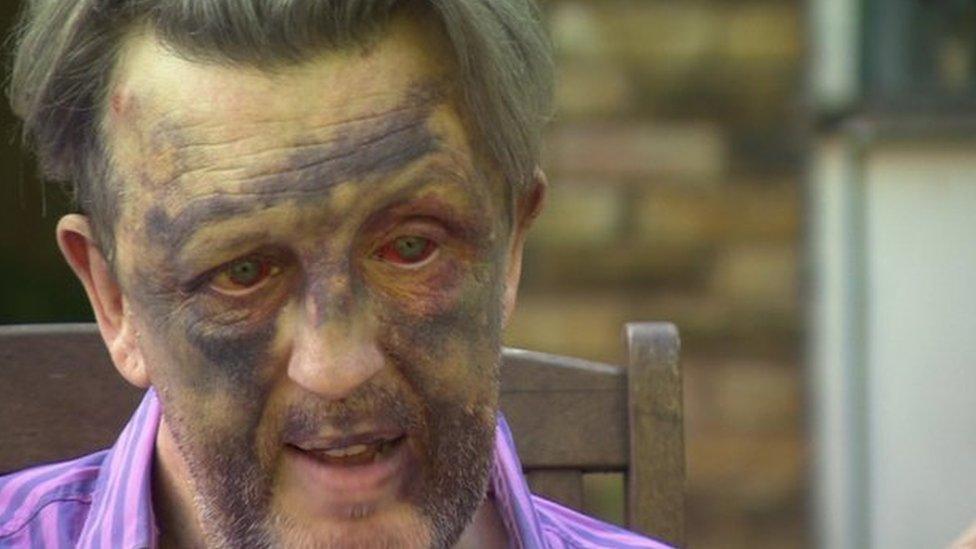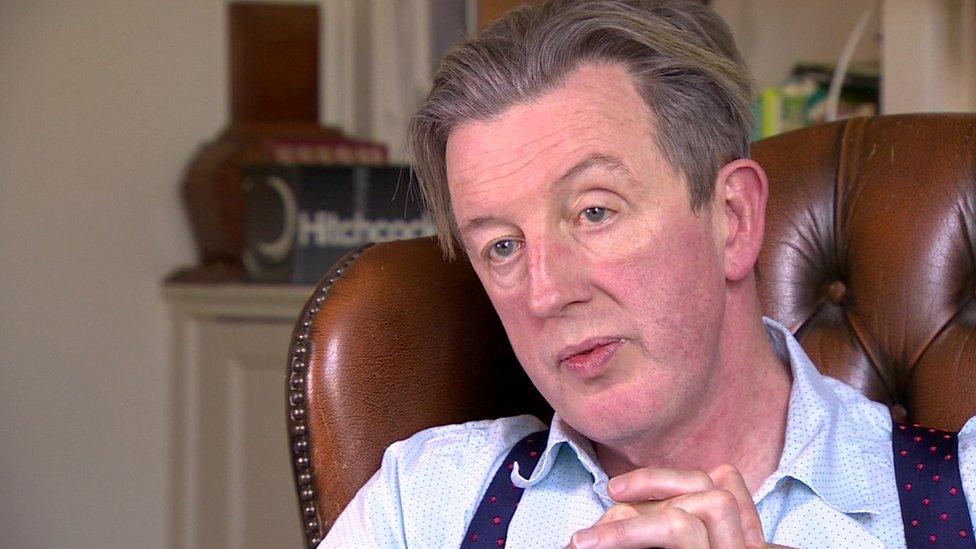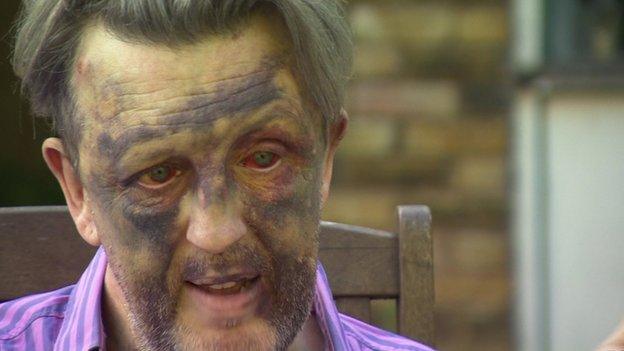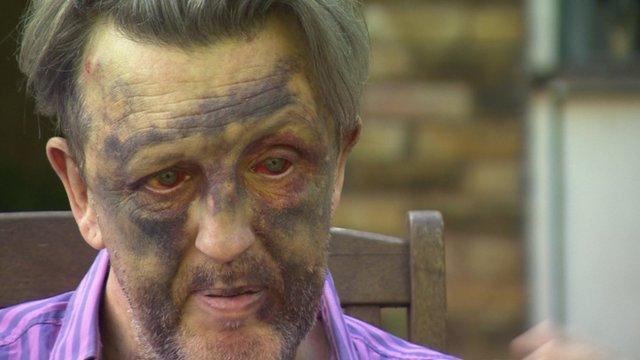Crime victims should have right to contact offenders - MPs
- Published

Paul Kohler needed facial reconstruction surgery after he was attacked in his home
All victims of crime in England and Wales should have a legal right to contact with offenders, MPs say.
A report by the Justice Committee, external of MPs said the provision of restorative justice schemes was currently a "postcode lottery".
Paul Kohler, who was beaten in his home in 2014, said it was "empowering and cathartic" to meet his attacker, but the process was not right for everyone.
The Ministry of Justice said it would consider the report carefully.
Restorative justice 'is about empowerment', says victim
Restorative justice, which allows victims to meet or contact the perpetrators of crimes against them, can be initiated by either party.
Victims currently have the right to be informed of restorative justice schemes under the Victims' Code, external - which sets the minimum level of service victims are entitled to.
But MPs found that under the Victims' Code, there was evidence of "mixed compliance" in the way victims were made aware of their rights to restorative justice schemes.
They also said the schemes on offer were subject to a "postcode lottery", and voiced doubts about the use of services in the case of sexual offences, domestic abuse and hate crime.
The report said: "Our view is that, while restorative justice will not be appropriate in every case, it should not be excluded simply by reason of the type of offence committed."
The MPs said the government should "work towards" establishing a law that gives all victims the right to restorative justice.
'Useful technique'
Mr Kohler, who needed facial reconstruction surgery after he was attacked at his Wimbledon home in August 2014, chose to meet one of his four attackers through the scheme.
The lecturer told the BBC he felt "empowered" rather than angry, and felt some pity for the offender.
"In the end we shook hands," he added.

Mr Kohler chose to take part in the restorative justice scheme
But he said there were "dangers" in the scheme.
"It is important we don't say to everyone they should do it, because those who want to do it and then can't [because] the perpetrator won't do it will feel humiliated, will feel let down," he said.
"Equally, if you push people too hard to do it, they will do it out of a sense of duty... and that would be bad as well."
He said he took his wife and daughter with him to meet his attacker.
"I don't think my wife particularly enjoyed it... my daughter on the other hand found it incredibly useful," he said.

What is restorative justice?
Restorative justice enables victims to meet or communicate with offenders to explain the real impact of the crime.
For communication to take place, the offender must have admitted the crime, and both the victim and offender must be willing to participate.
Meetings take place in a controlled environment, with a facilitator to ensure the process is safe.
Restorative justice is used most commonly in relation to burglary, robbery, grievous bodily harm and assault. It is well established in the youth justice system.
It reduces the frequency of reoffending by 14%, according to a 2010 government report, external.
The government committed to providing £29m of funding for restorative justice projects in England and Wales for 2013-16.

Katy Bourne, Police and Crime Commissioner for Sussex and vice chair of the standing group on supporting victims, welcomed the report.
She told BBC Radio 4's Today programme: "Often the criminal justice system tends to focus on punishment and the victims are left frustrated with unanswered questions."
The report made some "great recommendations" which could strengthen the Victims' Code, she added.
BBC legal affairs correspondent Clive Coleman said the report underscored that restorative justice could empower victims, reduce re-offending and save money, though the committee said one study that found it saves £8 for every £1 spent should not be relied upon.
Tory MP Bob Neill, chairman of the committee, said "capacity issues" meant it was too soon to introduce a legislative right to restorative justice for victims, because it should only come into force once ministers have demonstrated that the system has sufficient capacity to provide restorative justice services to all victims.
But he urged the government to "work towards this goal".
"We heard extensive evidence of the tangible benefits to victims and the role of restorative justice in reducing reoffending, so it clearly benefits wider society as well," he said.
A Ministry of Justice spokesman said: "It is vital that victims see swift and certain justice delivered to offenders.
"Under the Victims' Code, which was introduced last year, all victims can now receive information on how they can take part in restorative justice.
"In addition we have protected the victims' budget and given police and crime commissioners greater flexibility over the services offered to victims in their areas."

Have you been involved in a restorative Justice scheme as either a victim or perpetrator of a crime? Email us at haveyoursay@bbc.co.uk, external and please include a telephone number if you are happy to be contact by a BBC journalist.
You can also contact us in the following ways:
WhatsApp: +44 7525 900971
Tweet: @BBC_HaveYourSay, external
Text an SMS or MMS to 61124
- Published22 October 2015

- Published30 January 2015

- Published17 August 2014

- Published10 September 2013
